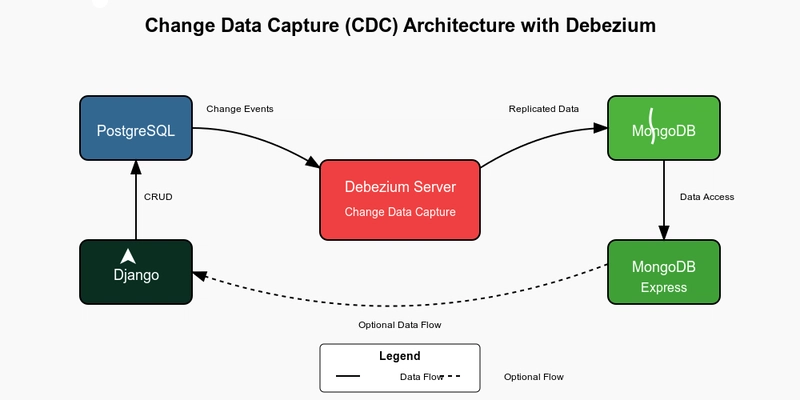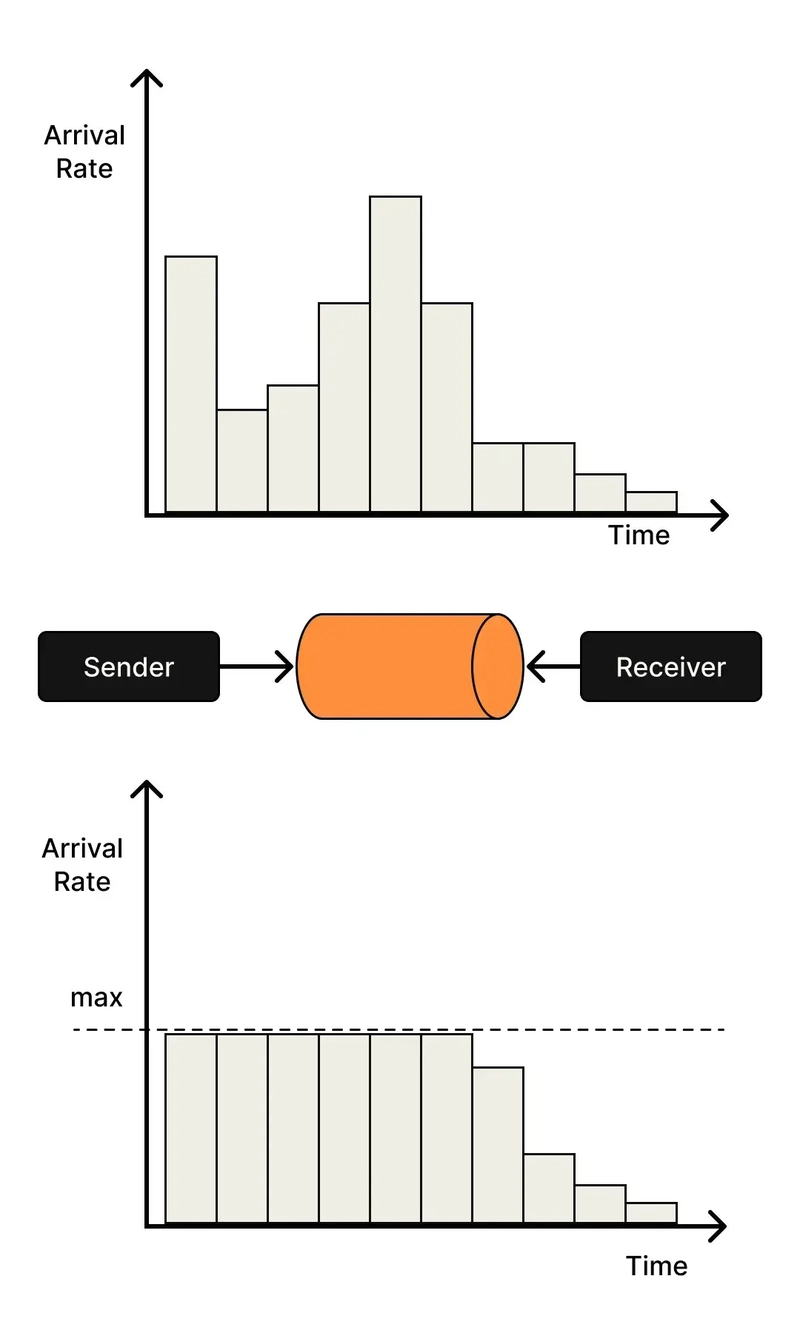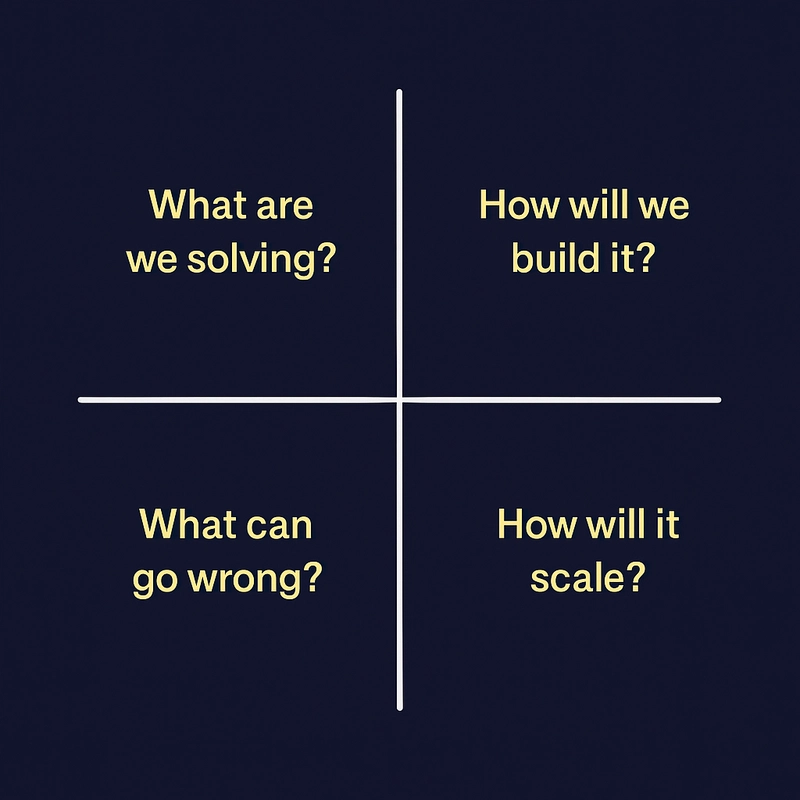When I explored CDC (Change Data Capture) implementations without Kafka, I found very little helpful material online. Most examples heavily depended on Kafka, but for many smaller systems, Kafka can feel too heavy.
So, I decided to create a clear, working project using Debezium Server (without Kafka) — integrated with Django, PostgreSQL, MongoDB and Mongo Express for Viewing the Changes — and document it for others.
This article will walk you through the architecture and steps with diagrams and screenshots.
👉 GitHub Repository: https://github.com/maqboolthoufeeq/cdc_debezium
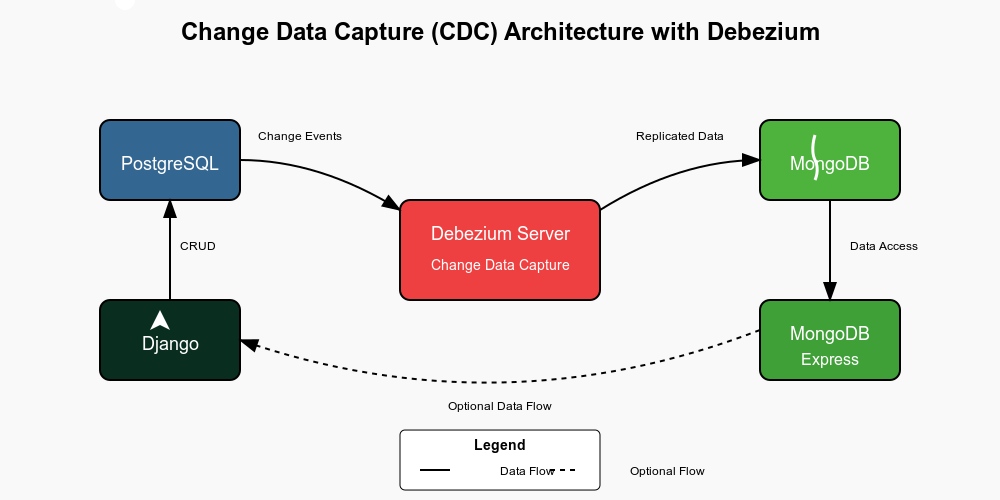
📌 Overview
This project shows how to capture database changes from a Django application (running on PostgreSQL), stream them using Debezium Server, and store the change events in MongoDB for analysis or auditing.
Main Components:
- Django (Admin Panel & API)
- PostgreSQL (Data Storage)
- Debezium Server (CDC without Kafka)
- MongoDB (Stores Change Events)
- Mongo Express (Web Viewer for MongoDB)
🛠 Architecture Diagram
Here’s the overall data flow:
- Django Admin updates data
- PostgreSQL stores the updated data
- Debezium Server detects changes
- Debezium Server sends CDC events to MongoDB
- Mongo Express lets us easily view the events
🚀 How to Run the Project
Folder Structure
cdc_debeizum/
├── README.md
└── cdc_debezium_server_mongo_django/
├── docker-compose.yml
├── debezium-config
├── postgres-conf
└── django- Clone the repository:
git clone https://github.com/maqboolthoufeeq/cdc_debezium.git
cd cdc_debezium/cdc_debezium_server_mongo_django- Build and Start the Services:
docker-compose build
docker-compose up🔥 First Look After Startup
Once everything is running, navigate to:
- Service Navigation Panel:
http://localhost:8000/ - Django Admin Panel:
http://localhost:8000/admin - Mongo Express Dashboard:
http://localhost:8086
Service Navigation Panel will show the other navigation links (Default passwords are already configured automatically.)
🧩 Step-by-Step Flow
Navigate to http://localhost:8000/
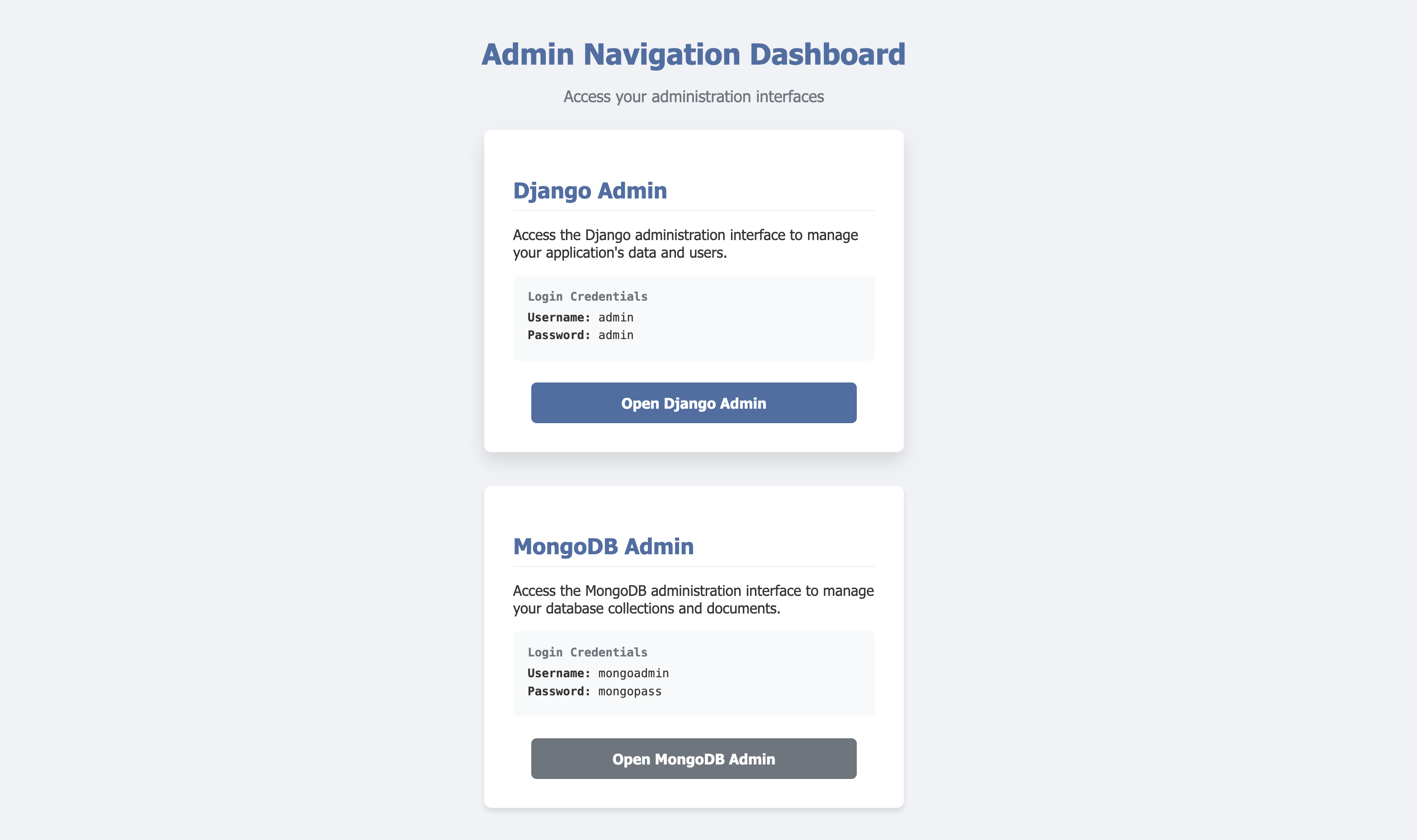
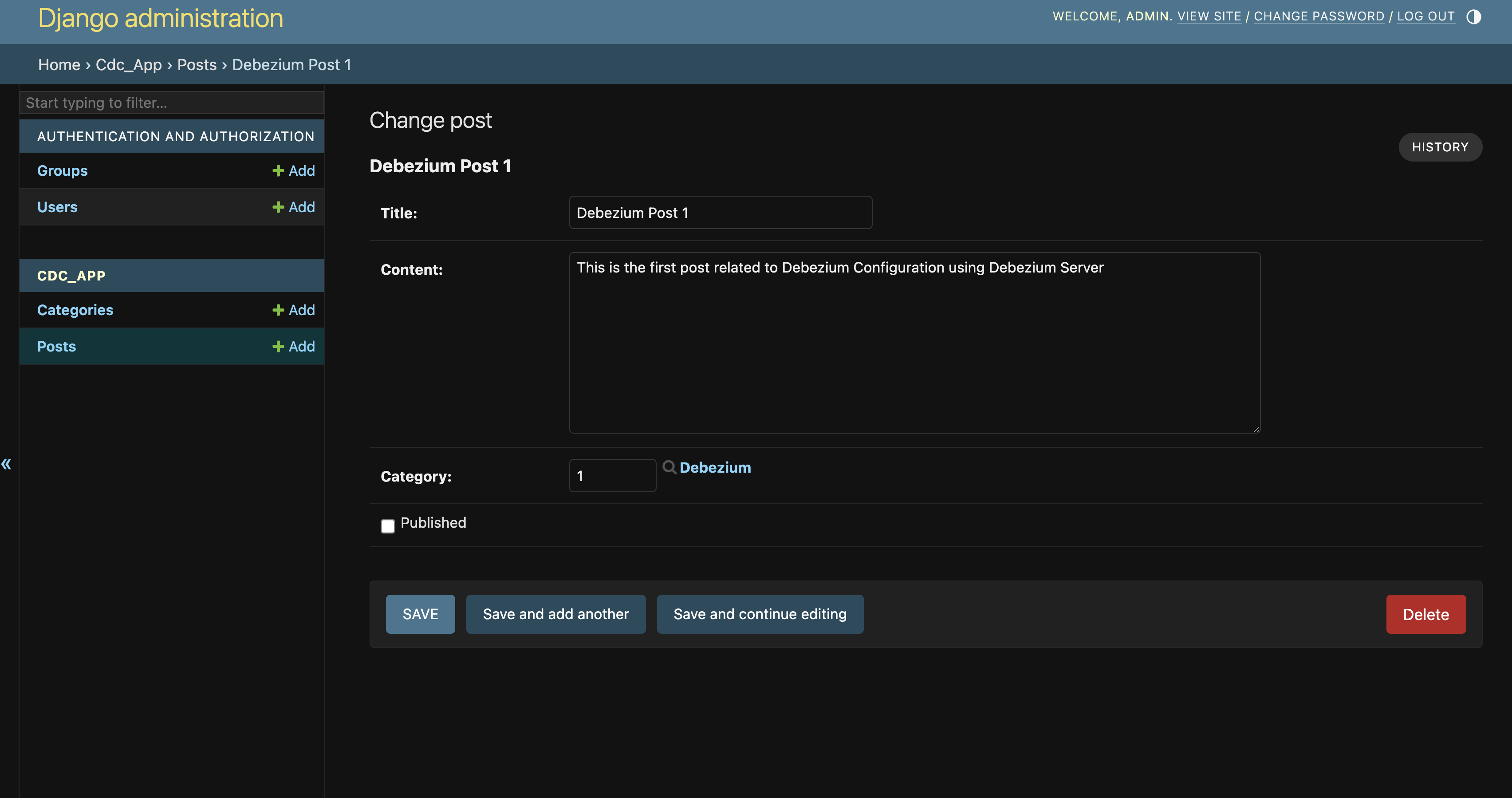
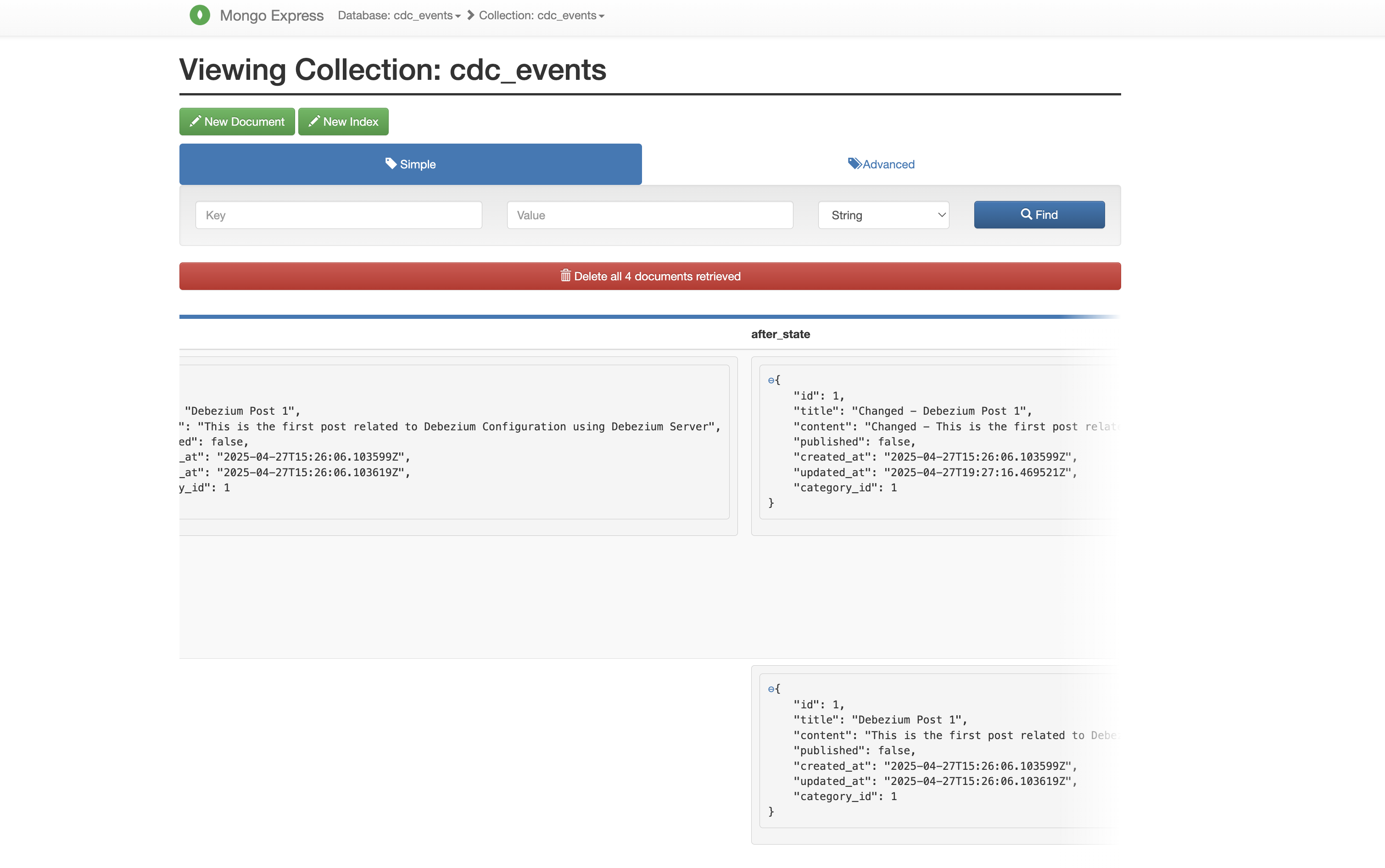
These are enough for your initial Experience, More technical details will be given below
🔍 Key Technical Configurations
1. PostgreSQL Setup (WAL Configuration)
In postgresql.conf, (cdc_debezium_server_mongo_django/postgres-conf/postgresql.conf ) we ensure:
wal_level = logical
max_wal_senders = 1000
max_replication_slots = 10002. Debezium Server Configuration
In application.properties(cdc_debezium_server_mongo_django/debezium-config/application.properties):
# ============================================================================
# DEBEZIUM POSTGRESQL CDC CONFIGURATION
# ============================================================================
# Core Connector Configuration
# ----------------------------
debezium.source.connector.class=io.debezium.connector.postgresql.PostgresConnector
debezium.source.offset.storage.file.filename=data/offsets.dat
debezium.source.offset.flush.interval.ms=60000
debezium.source.provide.transaction.metadata=false
# PostgreSQL Connection Details
# ----------------------------
debezium.source.database.hostname=postgres
debezium.source.database.port=5432
debezium.source.database.user=user
debezium.source.database.password=password
debezium.source.database.dbname=mydb
debezium.source.database.server.name=postgres_server
# Change Data Capture (CDC) Configuration
# ---------------------------------------
# Using pgoutput logical decoding plugin (native PostgreSQL)
debezium.source.plugin.name=pgoutput
debezium.source.publication.name=dbz_publication
# Only capture changes from specific tables
debezium.source.table.include.list=public.cdc_app_post,public.cdc_app_category
debezium.source.schema.include.list=public
# Don't emit a tombstone event on DELETE operations
debezium.source.tombstones.on.delete=false
# Always take an initial snapshot when starting
debezium.source.snapshot.mode=initial
# Include schema change events
debezium.source.include.schema.changes=true
# Handle decimal types precisely
debezium.source.decimal.handling.mode=precise
# Topic Configuration
# ------------------
# Required prefix for topic names even without Kafka
debezium.source.topic.prefix=postgres_cdc
# Data Format Configuration
# ------------------------
debezium.format.value=json
debezium.format.key.converter=org.apache.kafka.connect.json.JsonConverter
debezium.format.value.converter=org.apache.kafka.connect.json.JsonConverter
# Disable schema information in messages
debezium.source.key.converter.schemas.enable=false
debezium.source.value.converter.schemas.enable=false
# HTTP Sink Configuration
# ----------------------
debezium.sink.type=http
debezium.sink.http.url=http://django:8000/api/cdc/
debezium.sink.http.timeout.ms=30000
debezium.sink.http.retry.interval.ms=30000
debezium.sink.http.header.Content-Type=application/json
# Logging Configuration
# --------------------
quarkus.log.console.json=falseKey points:
- We specify
pgoutputas the decoding plugin. - We explicitly limit capture to selected tables (
Post,Category). - CDC events are posted directly to an HTTP endpoint or written to MongoDB.
3. Django Initialization Script
Custom management command init_cdc.py (cdc_debezium_server_mongo_django/django/cdc_app/management/commands/init_cdc.py) sets up:
- Logical replication slots.
- Publications for selected tables.
- Replica identities (so we can capture
beforeandafterstates).
Snippet:
from django.conf import settings
from django.core.management.base import BaseCommand
from django.db import connection
from cdc_app.models import Post, Category
DEBEZIUM_PUBLICATION_NAME = getattr(
settings, "DEBEZIUM_PUBLICATION_NAME", "dbz_publication"
)
DEBEZIUM_SLOT_NAME = getattr(settings, "DEBEZIUM_SLOT_NAME", "debezium")
# Get the actual table names from the models
TABLES_FOR_CDC = [Post._meta.db_table, Category._meta.db_table]
class Command(BaseCommand):
help = (
"Initialize CDC by setting replication permissions, creating a "
+ "logical replication slot (if needed), and configuring publications and "
+ "replica identities for the specified models."
)
def handle(self, *args, **options):
self.stdout.write("Starting CDC initialization...")
# Get current database user from connection
with connection.cursor() as cursor:
cursor.execute("SELECT current_user")
current_user = cursor.fetchone()[0]
self.stdout.write(f"Current database user: {current_user}")
# Global commands: these apply to the entire database.
global_commands = [
f'ALTER ROLE "{current_user}" WITH REPLICATION',
(
f"SELECT pg_create_logical_replication_slot('{DEBEZIUM_SLOT_NAME}', 'pgoutput') "
f"WHERE NOT EXISTS (SELECT 1 FROM pg_replication_slots WHERE "
f"slot_name = '{DEBEZIUM_SLOT_NAME}')"
),
]
with connection.cursor() as cursor:
for command in global_commands:
self.stdout.write(f"Executing global command: {command}")
try:
cursor.execute(command)
except Exception as e:
self.stderr.write(
f"Error executing global command:\n{command}\nError: {e}"
)
raise e
with connection.cursor() as cursor:
# Determine which of the specified tables exist in the database.
existing_tables = []
for table in TABLES_FOR_CDC:
cursor.execute(
"""
SELECT EXISTS (
SELECT 1
FROM information_schema.tables
WHERE table_schema = current_schema()
AND table_name = %s
)
""",
[table],
)
exists = cursor.fetchone()[0]
if exists:
existing_tables.append(table)
else:
self.stdout.write(f"Table '{table}' does not exist, skipping.")
# Skip CDC conf if none of the tables exist.
if not existing_tables:
self.stdout.write(
"No specified tables found, skipping CDC configuration."
)
return
# Create a publication with the existing tables.
publication_name = DEBEZIUM_PUBLICATION_NAME
tables_sql = ", ".join(f'"{table}"' for table in existing_tables)
publication_command = f"""
DO $$
BEGIN
IF NOT EXISTS (
SELECT 1
FROM pg_publication
WHERE pubname = '{publication_name}'
) THEN
CREATE PUBLICATION {publication_name}
FOR TABLE {tables_sql};
END IF;
END$$;
"""
self.stdout.write(
f"Executing publication command:\n{publication_command.strip()}"
)
try:
cursor.execute(publication_command)
except Exception as e:
self.stderr.write(f"Error executing publication command: {e}")
raise e
# Alter each table to use full replica identity.
for table in existing_tables:
alter_command = f'ALTER TABLE "{table}" REPLICA IDENTITY FULL'
self.stdout.write(f"Executing: {alter_command}")
try:
cursor.execute(alter_command)
except Exception as e:
self.stderr.write(
f"Error executing alter command for table '{table}': {e}"
)
raise e
self.stdout.write(self.style.SUCCESS("CDC initialization complete."))This script auto-runs during Django container startup.
4. Docker Compose
Key services in docker-compose.yaml:
- postgres (Debezium-enabled by the commad)
- django
- debezium (Debezium Server 3.0)
- mongodb
- mongo-express
All services are on a shared Docker network for easy communication.
🏁 Final Thoughts
Change Data Capture doesn’t have to be complicated. With Debezium Server and smart choices like MongoDB as a sink, you can build powerful, event-driven architectures — without the heavy lifting of Kafka.
Feel free to clone, modify, and extend the project. I built this because I couldn’t find a good resource online — so now you have one!
👉 GitHub Repository: https://github.com/maqboolthoufeeq/cdc_debezium
If you find it helpful, consider ⭐ starring the repo!
